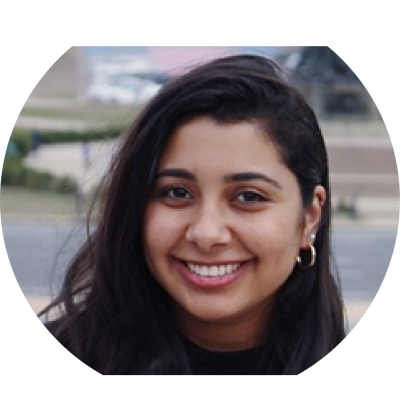
Sarah Yoseph Neshat
In the Green Lab and Doloff Lab, what I’ve had the privilege of exploring is unique in that I’m exploring both arms of the immune system when it comes to dysregulation and disease. My research dissertation aims to develop and screen biomaterial-based mRNA nanoparticle formulations to target immune cells, such as antigen presenting cells, for oncology and autoimmune therapies. There is an urgent need for a therapeutic that can engineer the immune system to prevent disease progression at early stages and have a long-lasting and transformative effect on patients. Recent novel nonviral delivery biotechnologies have great potential to impact medicine and are being investigated in clinical trials with a few in the clinic today, such as the current Moderna and Pfizer/BioNTech mRNA SARS-CoV-2 vaccine in addition to Alnylam’s RNAi therapy for rare hereditary diseases — setting precedent for subsequent gene delivery methodologies such as my dissertation.
Questions & Answers
Why did you choose Johns Hopkins for your work?
The biomedical engineering department is affiliated with both the school of medicine and the school of engineering, which allowed me take courses in both schools and fosters a unique collaborative environment among engineers, scientists and clinicians. It was important that I attended a university that values translation of research with the goal of developing technology that can and will impact patient lives. Plus, biomedical engineering is ranked #1!
What does receiving this award mean to you personally and professionally? Do you have any connection with the particular award you received?
Receiving this award carries personal significance as it acknowledges the collective efforts of our team and the impact of our work. Being recognized alongside the talented winners of previous Young Investigators’ Day awards is truly inspiring and an immense honor. Dr. Paul Talalay was a distinguished professor in the field of cancer prevention, and I aspire to emulate even a fraction of his greatness as a scientist!
What contributed to your project’s success?
Several factors contributed to the success of our project. Firstly, the guidance and support provided by my thesis advisers, Dr. Green and Dr. Doloff, were invaluable. Their expertise, mentorship and unwavering encouragement helped steer the project in the right direction and overcome challenges along the way. Additionally, the collaborative atmosphere within the labs, fostered by my dedicated labmates, played a crucial role. We made sure to conduct rigorous science while also having fun. Their insights, feedback and willingness to brainstorm ideas contributed significantly to my project’s development. Moreover, my own special skills and interests, coupled with the opportunities provided by the research environment, allowed me to contribute meaningfully to the project’s outcomes. Overall, it was a combination of supportive success.
What thoughts do you have about Young Investigators’ Day itself, as a celebration of the roles students and fellows play in research at Johns Hopkins?
- Young Investigators’ Day serves as a vital celebration of the invaluable contributions that students and fellows make to research at The Johns Hopkins University. It highlights the importance of nurturing and recognizing emerging talent in the scientific community, while also fostering a sense of camaraderie and support among researchers at different stages of their careers. This event not only honors the achievements of young scientists but also inspires them to continue pushing the boundaries of knowledge and innovation in their respective fields!
What has been your best/most memorable experience while at Johns Hopkins?
- My most memorable experience at Johns Hopkins has been all of the people I’ve met along the way. It has been the privilege of collaborating with a diverse and talented array of individuals, including friends, each bringing unique perspectives and expertise to our shared endeavors.
What are your plans over the next year or so? Graduating, looking for faculty positions, etc.?
- I am looking forward to graduating this year and immersing myself in a new challenge and the next captivating problem to explore.
Tell me something interesting about yourself that makes you unique. Do you have any special hobbies, interests or life experiences?
- I love to travel (I’ve been to 38 countries!) and I’ve enjoyed attending conferences in graduate school where I get to combine my love for exploring new cities with science. Additionally, I have a passion for cooking and delving into the science behind culinary techniques, flavors and creativity.